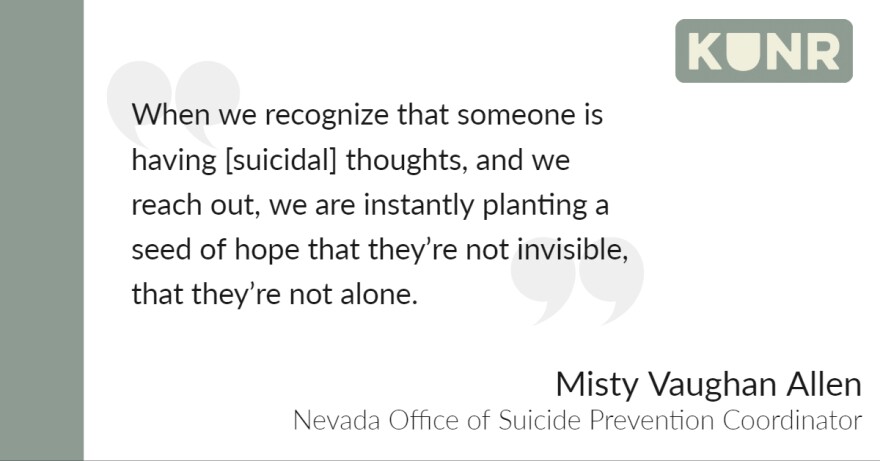In the U.S., more than half of the nearly 40,000 gun-related deaths in 2017 were from suicides, according to the Centers for Disease Control and Prevention. That proportion is even higher in Nevada. KUNR’s Anh Gray sat down with the state’s Suicide Prevention Coordinator Misty Vaughan Allen to explore this issue.
Even though suicide has been increasing across the nation since 1999, it has slightly decreased in Nevada by about one percent. That’s according to Misty Vaughan Allen, who’s with the Nevada Division of Public and Behavioral Health Office of Suicide Prevention. She says the state ranks 11th in the nation.
“There are many reasons why our rates are higher; suicide is very complex, so there’s rarely one risk factor or one event that leads someone to have thoughts of suicide,” Vaughan Allen explains. Washoe and Clark Counties are the two urban communities in the state, but there are 14 other rural counties.
“Nevada is a very rural state, so there’s isolation and transportation challenges, there are environmental barriers, such as distance to help, but there’s also lack of access to help, which is challenging, especially in our rural communities,” she said.
About two-thirds of suicides in Nevada are firearm-related, exceeding the rest of the nation. Vaughan Allen explains that seniors, especially older white males, and veterans are the most vulnerable groups. To reduce gun-related suicides, Vaughan Allen says her agency reaches out to gun owners, gun shops and to gun shows to implement education and awareness programs about how to safely store guns and other lethal means, like medication.
“So our reducing access to lethal means has decreased rates,” Vaughan Allen explains, “and we need to make sure people are aware: medication safes [and] gun locks are available to any family.”
Eliminating the stigma surrounding suicide is critical to suicide prevention efforts.
“The largest myth that we still hear out there is that if you talk about suicide, you’ll plant the seed,” Vaughan Allen said. “The majority of people with thoughts about suicide desperately want someone to recognize that they’re having these thoughts and have a conversation about it.”
Providing accessible resources, like hotlines that enable people to reach out for help, is critical to suicide prevention. But Vaughan Allen says crisis intervention—having someone offer to help—can be invaluable in suicide prevention. “Suicide is not about wanting to die; suicide is about wanting to end the pain,” Vaughan Allen explains.
“When we recognize that someone is having thoughts, and we reach out, we are instantly planting a seed of hope that they’re not invisible, that they’re not alone.”
If you or someone you know is in crisis, please contact the National Suicide Prevention Hotline at 1-800-273-TALK or find more information about the Suicide Prevention Hotline.







